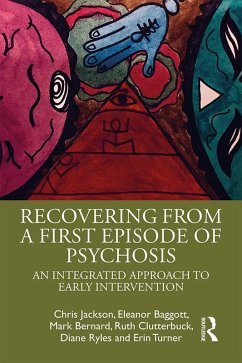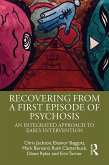Chris Jackson, Eleanor Baggott, Mark Bernard, Ruth Clutterbuck, Diane Ryles, Erin Turner
Recovering from a First Episode of Psychosis (eBook, ePUB)
An Integrated Approach to Early Intervention
33,95 €
33,95 €
inkl. MwSt.
Sofort per Download lieferbar

17 °P sammeln
33,95 €
Als Download kaufen

33,95 €
inkl. MwSt.
Sofort per Download lieferbar

17 °P sammeln
Jetzt verschenken
Alle Infos zum eBook verschenken
33,95 €
inkl. MwSt.
Sofort per Download lieferbar
Alle Infos zum eBook verschenken

17 °P sammeln
Chris Jackson, Eleanor Baggott, Mark Bernard, Ruth Clutterbuck, Diane Ryles, Erin Turner
Recovering from a First Episode of Psychosis (eBook, ePUB)
An Integrated Approach to Early Intervention
- Format: ePub
- Merkliste
- Auf die Merkliste
- Bewerten Bewerten
- Teilen
- Produkt teilen
- Produkterinnerung
- Produkterinnerung

Bitte loggen Sie sich zunächst in Ihr Kundenkonto ein oder registrieren Sie sich bei
bücher.de, um das eBook-Abo tolino select nutzen zu können.
Hier können Sie sich einloggen
Hier können Sie sich einloggen
Sie sind bereits eingeloggt. Klicken Sie auf 2. tolino select Abo, um fortzufahren.

Bitte loggen Sie sich zunächst in Ihr Kundenkonto ein oder registrieren Sie sich bei bücher.de, um das eBook-Abo tolino select nutzen zu können.
The onset of psychosis provides an opportunity to intervene early in order to optimise the impact of medical and psychosocial treatments on the long-term course of the disorder. This timely book comes from experienced clinicians working in the UK's first Early Intervention service.
- Geräte: eReader
- mit Kopierschutz
- eBook Hilfe
- Größe: 6.09MB
Andere Kunden interessierten sich auch für
![Recovering from a First Episode of Psychosis (eBook, PDF) Recovering from a First Episode of Psychosis (eBook, PDF)]() Chris JacksonRecovering from a First Episode of Psychosis (eBook, PDF)33,95 €
Chris JacksonRecovering from a First Episode of Psychosis (eBook, PDF)33,95 €![CBT for Those at Risk of a First Episode Psychosis (eBook, ePUB) CBT for Those at Risk of a First Episode Psychosis (eBook, ePUB)]() Mark van der GaagCBT for Those at Risk of a First Episode Psychosis (eBook, ePUB)49,95 €
Mark van der GaagCBT for Those at Risk of a First Episode Psychosis (eBook, ePUB)49,95 €![Recovering from Psychosis (eBook, ePUB) Recovering from Psychosis (eBook, ePUB)]() Stephen WilliamsRecovering from Psychosis (eBook, ePUB)29,95 €
Stephen WilliamsRecovering from Psychosis (eBook, ePUB)29,95 €![Attachment Theory and Psychosis (eBook, ePUB) Attachment Theory and Psychosis (eBook, ePUB)]() Attachment Theory and Psychosis (eBook, ePUB)37,95 €
Attachment Theory and Psychosis (eBook, ePUB)37,95 €![Innovations in Psychosocial Interventions for Psychosis (eBook, ePUB) Innovations in Psychosocial Interventions for Psychosis (eBook, ePUB)]() Alan MeadenInnovations in Psychosocial Interventions for Psychosis (eBook, ePUB)45,95 €
Alan MeadenInnovations in Psychosocial Interventions for Psychosis (eBook, ePUB)45,95 €![The Recovery of the Self in Psychosis (eBook, ePUB) The Recovery of the Self in Psychosis (eBook, ePUB)]() The Recovery of the Self in Psychosis (eBook, ePUB)33,95 €
The Recovery of the Self in Psychosis (eBook, ePUB)33,95 €![Toxic Interactions and the Social Geography of Psychosis (eBook, ePUB) Toxic Interactions and the Social Geography of Psychosis (eBook, ePUB)]() Hugh MiddletonToxic Interactions and the Social Geography of Psychosis (eBook, ePUB)33,95 €
Hugh MiddletonToxic Interactions and the Social Geography of Psychosis (eBook, ePUB)33,95 €-
-
-
The onset of psychosis provides an opportunity to intervene early in order to optimise the impact of medical and psychosocial treatments on the long-term course of the disorder. This timely book comes from experienced clinicians working in the UK's first Early Intervention service.
Dieser Download kann aus rechtlichen Gründen nur mit Rechnungsadresse in A, B, BG, CY, CZ, D, DK, EW, E, FIN, F, GR, HR, H, IRL, I, LT, L, LR, M, NL, PL, P, R, S, SLO, SK ausgeliefert werden.
Produktdetails
- Produktdetails
- Verlag: Taylor & Francis eBooks
- Seitenzahl: 396
- Erscheinungstermin: 7. Mai 2019
- Englisch
- ISBN-13: 9781315460710
- Artikelnr.: 56623561
- Verlag: Taylor & Francis eBooks
- Seitenzahl: 396
- Erscheinungstermin: 7. Mai 2019
- Englisch
- ISBN-13: 9781315460710
- Artikelnr.: 56623561
- Herstellerkennzeichnung Die Herstellerinformationen sind derzeit nicht verfügbar.
Chris Jackson is a consultant clinical psychologist and clinical lead for the Birmingham EIP service, Forward Thinking Birmingham. He has been involved in the development of psychological therapies for FEP for the last 25 years and has co-authored books on schizophrenia and early intervention approaches to first episode psychosis. His current interests include recovery, suicide prevention and emotional dysfunction following FEP, as well as refining the delivery of EIP services.
Eleanor Baggott is a UK-trained clinical psychologist. She worked at Birmingham and Solihull EIP for five years before emigrating to New Zealand. She is currently the senior clinical psychologist at Totara House, the EIP service in Christchurch, and sits on the executive committee of the NZ EIP Society. She has a special interest in working with families and using mindfulness and acceptance-based approaches.
Mark Bernard is a principal clinical psychologist in the North Birmingham Early Intervention Psychosis Team within Forward Thinking Birmingham, UK. His current interests include the application of psychological approaches following first episode psychosis, the use of Routine Outcome Measures within Early Intervention Psychosis services, and the development of clinical pathways for At Risk Mental States.
Ruth Clutterbuck is a senior clinical psychologist in the East Birmingham Early Intervention for Psychosis Team, Forward Thinking Birmingham, UK. She has a special interest in social recovery following a first episode psychosis and leads on social recovery strategy for Birmingham EIP services.
Diane Ryles qualified as a mental health nurse in North Staffordshire 28 years ago. She was an original member of the West Midlands IRIS group and worked in Birmingham EIP for 14 years as a care co-ordinator, lead nurse and manager. She is now the matron for recovery services, and a trainer in family work and suicide prevention. She is also a carer for a relative with psychosis.
Erin Turner is a consultant psychiatrist in the Early Intervention for Psychosis Service, Solihull, UK, Co-chair of West Midlands EIP Expert Advisory Group and trustee of mental health charity 'Beyond Shame, Beyond Stigma'. She led the development of the 'Silver Linings' app for young people recovering from psychosis and is a board member of HEARTH, Theatre Company. Her interests include promoting collaborative compassionate care and using the arts to reduce stigma and demystify psychosis.
Eleanor Baggott is a UK-trained clinical psychologist. She worked at Birmingham and Solihull EIP for five years before emigrating to New Zealand. She is currently the senior clinical psychologist at Totara House, the EIP service in Christchurch, and sits on the executive committee of the NZ EIP Society. She has a special interest in working with families and using mindfulness and acceptance-based approaches.
Mark Bernard is a principal clinical psychologist in the North Birmingham Early Intervention Psychosis Team within Forward Thinking Birmingham, UK. His current interests include the application of psychological approaches following first episode psychosis, the use of Routine Outcome Measures within Early Intervention Psychosis services, and the development of clinical pathways for At Risk Mental States.
Ruth Clutterbuck is a senior clinical psychologist in the East Birmingham Early Intervention for Psychosis Team, Forward Thinking Birmingham, UK. She has a special interest in social recovery following a first episode psychosis and leads on social recovery strategy for Birmingham EIP services.
Diane Ryles qualified as a mental health nurse in North Staffordshire 28 years ago. She was an original member of the West Midlands IRIS group and worked in Birmingham EIP for 14 years as a care co-ordinator, lead nurse and manager. She is now the matron for recovery services, and a trainer in family work and suicide prevention. She is also a carer for a relative with psychosis.
Erin Turner is a consultant psychiatrist in the Early Intervention for Psychosis Service, Solihull, UK, Co-chair of West Midlands EIP Expert Advisory Group and trustee of mental health charity 'Beyond Shame, Beyond Stigma'. She led the development of the 'Silver Linings' app for young people recovering from psychosis and is a board member of HEARTH, Theatre Company. Her interests include promoting collaborative compassionate care and using the arts to reduce stigma and demystify psychosis.
Foreword: From psychosis to politics Foreword: A carer's experience 1. The
first episode of psychosis and how EIP services have evolved to optimise
adaptation and recovery 2. Adapting, adjusting and recovering from a first
episode of psychosis: the need for integration 3. Biological and medical
approaches to symptomatic recovery and adaptation 4. Psychosocial
approaches to symptomatic recovery and adaptation 5. Social recovery in
first episode psychosis 6. Treatment approaches to social recovery in first
episode psychosis 7. Optimising personal recovery and promoting
psychological adaptation following first episode psychosis 8. When
psychological adaptation and recovery go wrong 9. Identifying and managing
suicidality following a first episode of psychosis 10. Working with
comorbidity and diagnostic uncertainty 11. Family adaptation and recovery
following FEP 12. Integrating and operationalising symptomatic, social and
personal recovery: managing EIP and pathways of care Conclusion Appendix 1
Appendix 2
first episode of psychosis and how EIP services have evolved to optimise
adaptation and recovery 2. Adapting, adjusting and recovering from a first
episode of psychosis: the need for integration 3. Biological and medical
approaches to symptomatic recovery and adaptation 4. Psychosocial
approaches to symptomatic recovery and adaptation 5. Social recovery in
first episode psychosis 6. Treatment approaches to social recovery in first
episode psychosis 7. Optimising personal recovery and promoting
psychological adaptation following first episode psychosis 8. When
psychological adaptation and recovery go wrong 9. Identifying and managing
suicidality following a first episode of psychosis 10. Working with
comorbidity and diagnostic uncertainty 11. Family adaptation and recovery
following FEP 12. Integrating and operationalising symptomatic, social and
personal recovery: managing EIP and pathways of care Conclusion Appendix 1
Appendix 2
Foreword: From psychosis to politics Foreword: A carer's experience 1. The
first episode of psychosis and how EIP services have evolved to optimise
adaptation and recovery 2. Adapting, adjusting and recovering from a first
episode of psychosis: the need for integration 3. Biological and medical
approaches to symptomatic recovery and adaptation 4. Psychosocial
approaches to symptomatic recovery and adaptation 5. Social recovery in
first episode psychosis 6. Treatment approaches to social recovery in first
episode psychosis 7. Optimising personal recovery and promoting
psychological adaptation following first episode psychosis 8. When
psychological adaptation and recovery go wrong 9. Identifying and managing
suicidality following a first episode of psychosis 10. Working with
comorbidity and diagnostic uncertainty 11. Family adaptation and recovery
following FEP 12. Integrating and operationalising symptomatic, social and
personal recovery: managing EIP and pathways of care Conclusion Appendix 1
Appendix 2
first episode of psychosis and how EIP services have evolved to optimise
adaptation and recovery 2. Adapting, adjusting and recovering from a first
episode of psychosis: the need for integration 3. Biological and medical
approaches to symptomatic recovery and adaptation 4. Psychosocial
approaches to symptomatic recovery and adaptation 5. Social recovery in
first episode psychosis 6. Treatment approaches to social recovery in first
episode psychosis 7. Optimising personal recovery and promoting
psychological adaptation following first episode psychosis 8. When
psychological adaptation and recovery go wrong 9. Identifying and managing
suicidality following a first episode of psychosis 10. Working with
comorbidity and diagnostic uncertainty 11. Family adaptation and recovery
following FEP 12. Integrating and operationalising symptomatic, social and
personal recovery: managing EIP and pathways of care Conclusion Appendix 1
Appendix 2







